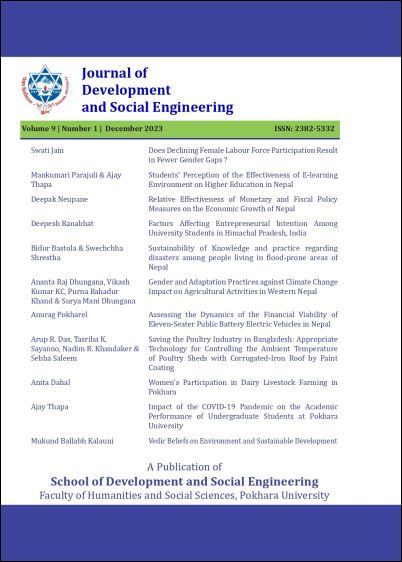Students’ Perception of the Effectiveness of E-learning Environment on Higher Education in Nepal
DOI:
https://doi.org/10.3126/jdse.v9i01.70554Keywords:
perception, Elearning environment, higher educationAbstract
The study aimed to analyze students’ perceptions of the effectiveness of e-learning in higher education in Nepal. The study adopted a quantitative research approach. Data were obtained using an online survey from 83 students of Pokhara University studying in the School of Development and Social Engineering. Both descriptive and inferential statistics were used to analyze the data. The results indicated that the majority of the students have a positive attitude towards e-learning. Adequate skills to operate an e-learning system was found to have a profound role in shaping students ‘attitude, the feeling of usefulness and ease of use of the e-learning system. Instructors’ collaboration and support were identified to play the paramount role in setting a positive attitude, instilling a sense of usefulness towards e-learning and easing its use. The study revealed a significant positive correlation between students’ attitudes towards e-learning, the quality of the e-learning system, usefulness, and ease of use of e-learning system. E-learning embraced as an alternative to traditional forms of teaching and learning, was found to have an enormous value to offer in this globalized world where internet penetration along with other ICT advancements in every part of the world has a significant role. The study concluded that the students at the tertiary level are very positive toe-learning, so, universities in Nepal can make a grand shift in the way of teaching and learning shifting from conventional to full -fledged e-learning practices.
Downloads
Downloads
Published
How to Cite
Issue
Section
License
Copyright © Journal of Development and Social Engineering, School of Development and Social Engineering, Faculty of Humanities and Social Sciences, Pokhara University. All rights reserved. The School of Development and Social Engineering, Pokhara University holds the exclusive copyright of all the contents of this journal. No part of this journal may be reproduced or transmitted by any media or publishing organizations including websites without the written permission of the copyright holder. The contents of this journal are available for any citation, using a recognized and proper referencing system.




